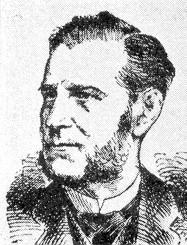
1819 - 1892 Person Name: S. Longfellow Alterer of "As darker, darker fall around" in Hymns of the Kingdom of God Longfellow, Samuel, B. A., brother of the Poet, was born at Portland, Maine, June 18, 1819, and educated at Harvard, where he graduated in Arts in 1839, and in Theology in 1846. On receiving ordination as an Unitarian Minister, he became Pastor at Fall River, Massachusetts, 1848; at Brooklyn, 1853; and at Germantown, Pennsylvania, 1860. In 1846 he edited, with the Rev. S. Johnson (q. v.), A Book of Hymns for Public and Private Devotion. This collection was enlarged and revised in 1848. In 1859 his Vespers was published, and in 1864 the Unitarian Hymns of the Spirit , under the joint editorship of the Rev. S. Johnson and himself. His Life of his brother, the Poet Longfellow, was published in 1886. To the works named he contributed the following hymns:—
i. To A Book of Hymns , revised ed., 1848.
1. Beneath the shadow of the Cross. Love.
2. 0 God, thy children gathered here. Ordination.
ii. To the Vespers 1859.
3. Again as evening's shadow falls. Evening.
4. Now on land and sea descending. Evening.
iii. To the Hymns of the Spirit, 1864.
5. A voice by Jordan's shore. Advent.
6. Father, give Thy benediction. Ordination.
7. Go forth to life, 0 child of earth. Life's Mission.
8. God of ages and of nations. Holy Scriptures.
9. Holy Spirit, Truth divine. The Holy Spirit desired.
10. I look to Thee in every need. Trust in God.
11. In the beginning was the Word. The Word.
12. Love for all, and can it be? Lent. The Prodigal Son.
13. 0 God, in Whom we live and move. God's Law and Love.
14. 0 God, Thou Giver of all good. Prayer for Food.
15. O still in accents sweet and strong. Missions.
16. 0 Thou, Whose liberal sun and rain. Anniversary of Church dedication.
17. One holy Church of God appears. The Church Universal.
18. Out of the dark, the circling sphere. The Outlook.
19. Peace, peace on earth! the heart of man for ever. Peace on Earth.
20. The loving Friend to all who bowed. Jesus of Nazareth.
21. ’Tis winter now, the fallen snow. Winter.
Of these, hymn No. 2 was written for the Ordination of E. E. Hale (q. v.), at Worcester, 1846. Several are included in Martineau's Hymns, 1873.
Died Oct. 3, 1892. [Rev. F. M. Bird, M.A.]
--John Julian, Dictionary of Hymnology (1907), p. 685
===============
Longfellow, S., p. 685, i. Since Mr. Longfellow's death on Oct. 3, 1892, his hymns have been collected by his niece, Miss Alice Longfellow, as Hymns and Verses(Houghton, Mifflin & Co., 1904.) From this work we find many of the hymns signed Anon, in the Index to Longfellow and Johnson's Hymns of the Spirit, 1864, were his; several of these, including E. Osier's "O God unseen, yet ever near," were popular English hymns which he rewrote from his own theological standpoint. These re¬written hymns are very widely used by Unitarians and others. During the last ten years the following additional hymns by S. Long¬fellow have come into common use:—
1. Eternal One, Thou living God. Faith in God.
2. God of the earth, the sky, the sea. God in Nature.
3. God's trumpet wakes the slumbering world. Call to duty.
4. Light of ages and of nations. God in and through all time.
5. Lo, the earth is risen again. Spring. (1876.)
6. Now while we sing our closing psalm. Close of Worship.
7. O Life that maketh all things new. Unity. (1874.)
8. O Thou in Whom we live and move. The Divine Law.
9. The summer days are come again. Summer. From his hymn,"The sweet[bright] June days are come again."
10. Thou Lord of lite, our saving health. In Sickness. (1886.)
Of these hymns Nos. 2, 3 appeared in the Hymns of the Spirit, 1864, and all with the dates appended in Hymns and Verses, 1904.
--John Julian, Dictionary of Hymnology, New Supplement (1907)
==================
http://en.wikipedia.org/wiki/Samuel_Longfellow
Samuel Longfellow


 My Starred Hymns
My Starred Hymns









